Don Dippo
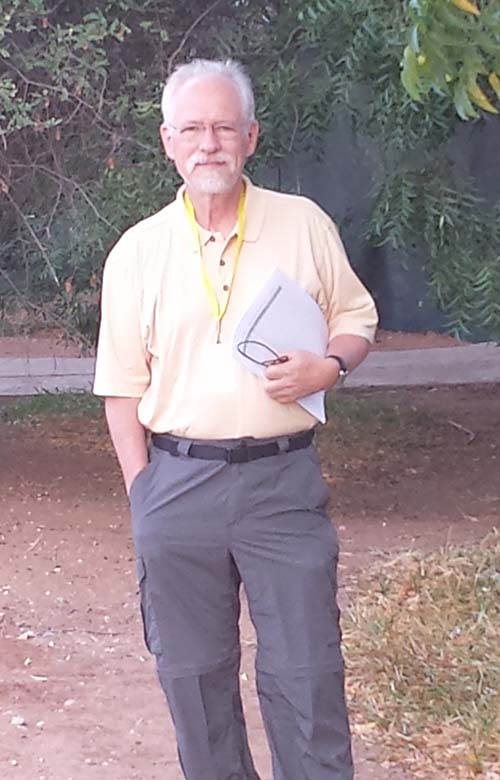 Don Dippo teaches the course, Education for Sustainable Development. This course provides an introduction to the role that education plays in creating a more sustainable future for all. The course aims to explain the emergence of the concepts of environmental sustainability, global citizenship, and the anticipated contributions of education at various levels (e.g. elementary, secondary, postsecondary, adult education), various global scales (e.g. bioregional, national, international) and in various contexts (e.g. classroom, nature, community). It begins with a critical and historical analysis of sustainability education, and then shifts to an examination of various approaches to thinking about and practicing education for sustainability. The course ends with the contemplation of questions concerned with ‘educating for a sustainable future.’ Students will have an opportunity to consider ways of bringing these issues into a school or community context, both through in-class group work and in their research topics.
Don Dippo teaches the course, Education for Sustainable Development. This course provides an introduction to the role that education plays in creating a more sustainable future for all. The course aims to explain the emergence of the concepts of environmental sustainability, global citizenship, and the anticipated contributions of education at various levels (e.g. elementary, secondary, postsecondary, adult education), various global scales (e.g. bioregional, national, international) and in various contexts (e.g. classroom, nature, community). It begins with a critical and historical analysis of sustainability education, and then shifts to an examination of various approaches to thinking about and practicing education for sustainability. The course ends with the contemplation of questions concerned with ‘educating for a sustainable future.’ Students will have an opportunity to consider ways of bringing these issues into a school or community context, both through in-class group work and in their research topics.
Lorraine Otoide
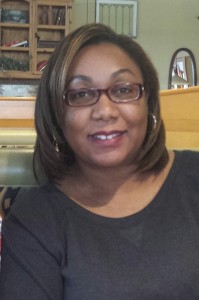 Lorraine Otoide received her PhD from the Faculty of Education, Language, Culture & Teaching at York University with a research focus in science education. Her research interests are interdisciplinary with a concentration in Science, Mathematics, and Technology Education. Her research agenda explores teaching and learning in these disciplines within the framework of teaching practice, culture, and identity within various educational contexts. Lorraine teaches the mathematics course for the BHER elementary teaching certificate. She is conducting research on a project that examines how pre-service and in-service teachers who reside and teach in Dadaab’s refugee camps adopt and implement practices such as, integration and inquiry in the teaching of primary level Mathematics, Science, and Technology, while preserving cultural perspectives.
Lorraine Otoide received her PhD from the Faculty of Education, Language, Culture & Teaching at York University with a research focus in science education. Her research interests are interdisciplinary with a concentration in Science, Mathematics, and Technology Education. Her research agenda explores teaching and learning in these disciplines within the framework of teaching practice, culture, and identity within various educational contexts. Lorraine teaches the mathematics course for the BHER elementary teaching certificate. She is conducting research on a project that examines how pre-service and in-service teachers who reside and teach in Dadaab’s refugee camps adopt and implement practices such as, integration and inquiry in the teaching of primary level Mathematics, Science, and Technology, while preserving cultural perspectives.
Jackie Robinson
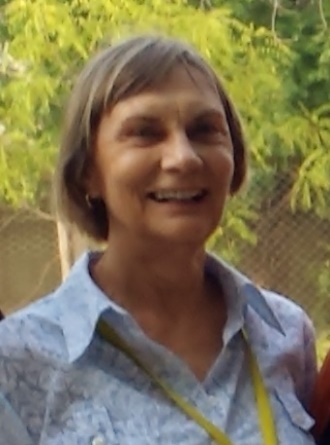 Jackie Robinson co-teaches Educating for a Sustainable Future with Don Dippo. For most students this course provides their first exposure to completing an online university program. While focusing on sustainability for the content, the course teaches the skills necessary to be a successful student in a distance program. Students learn to search online academic databases, and critically assess their findings to construct a coherent essay proposal, and then develop it into a short essay with a bibliography. Students also learn to navigate Moodle, the online learning platform used by both York and Kenyatta University.
Jackie Robinson co-teaches Educating for a Sustainable Future with Don Dippo. For most students this course provides their first exposure to completing an online university program. While focusing on sustainability for the content, the course teaches the skills necessary to be a successful student in a distance program. Students learn to search online academic databases, and critically assess their findings to construct a coherent essay proposal, and then develop it into a short essay with a bibliography. Students also learn to navigate Moodle, the online learning platform used by both York and Kenyatta University.
Colette Granger
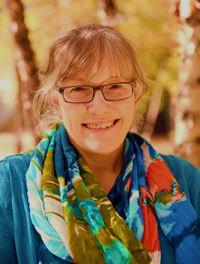 Colette Granger instructs two courses in the BHER elementary teaching certificate program. Human Development & Socialization considers physical, social, emotional and cognitive development in children and adolescents, the role teachers (and education as a whole) in those processes, and the ways in which social, economic, cultural and other factors – especially in refugee settings – can challenge or disrupt the work of growing up. Teaching Health & Physical Education looks at how learning about health-related issues (such as nutrition, sexual rights and responsibilities, and the importance of play) can contribute to self-understanding, informed decision-making, community solidarity and academic success; it also addresses questions related to teaching physical education in settings, such as Dadaab, where limited facilities and equipment, cultural traditions, and curricular expectations may limit opportunities for all students to participate equally in physical activity.
Colette Granger instructs two courses in the BHER elementary teaching certificate program. Human Development & Socialization considers physical, social, emotional and cognitive development in children and adolescents, the role teachers (and education as a whole) in those processes, and the ways in which social, economic, cultural and other factors – especially in refugee settings – can challenge or disrupt the work of growing up. Teaching Health & Physical Education looks at how learning about health-related issues (such as nutrition, sexual rights and responsibilities, and the importance of play) can contribute to self-understanding, informed decision-making, community solidarity and academic success; it also addresses questions related to teaching physical education in settings, such as Dadaab, where limited facilities and equipment, cultural traditions, and curricular expectations may limit opportunities for all students to participate equally in physical activity.
Wangui Kimari
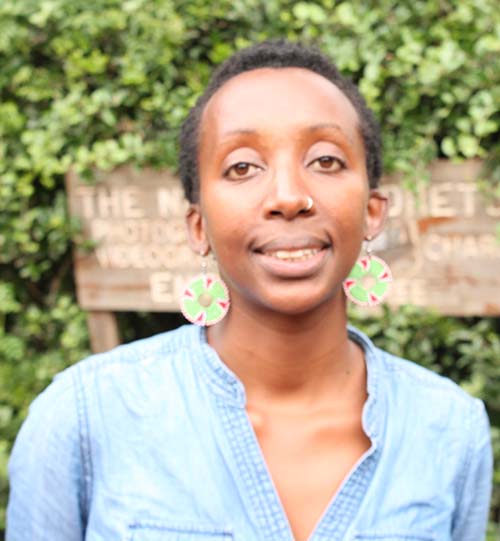 Wangui Kimari is a PhD student in the Department of Anthropology at York University, Canada. Her work focuses on the connections between urban planning and the policing of space in poor urban settlements, and examines what this means for the daily life and futures of young people and for the emergent future(s)of Nairobi broadly. Her field site is also shaped by the relationship(s) between older and recent residents born locally and in surrounding African countries. Wangui has been a part of the BHER project since 2014, and has served as a Teaching Assistant for various education courses delivered by faculty at York University and University of British Columbia, both on site in Dadaab and in Nairobi.
Wangui Kimari is a PhD student in the Department of Anthropology at York University, Canada. Her work focuses on the connections between urban planning and the policing of space in poor urban settlements, and examines what this means for the daily life and futures of young people and for the emergent future(s)of Nairobi broadly. Her field site is also shaped by the relationship(s) between older and recent residents born locally and in surrounding African countries. Wangui has been a part of the BHER project since 2014, and has served as a Teaching Assistant for various education courses delivered by faculty at York University and University of British Columbia, both on site in Dadaab and in Nairobi.
Dacia Douhaibi
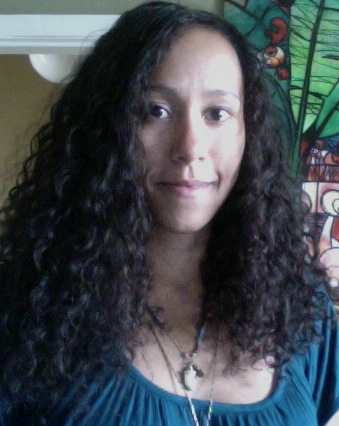 Dacia Douhaibi was a Teaching Assistant for the Global Issues and Education course delivered in April 2015 in Dadaab. This course gives students an opportunity to examine some conceptual and theoretical debates that surround analyses of globalization and education. This course was delivered completely online. Students learnt to explore innovative strategies for teaching and learning.
Dacia Douhaibi was a Teaching Assistant for the Global Issues and Education course delivered in April 2015 in Dadaab. This course gives students an opportunity to examine some conceptual and theoretical debates that surround analyses of globalization and education. This course was delivered completely online. Students learnt to explore innovative strategies for teaching and learning.
Hawa Sabriye
Hawa Sabriy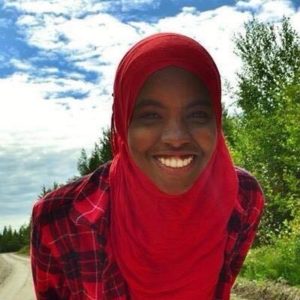 e is a Toronto based educator and is currently completing her Master of Education at York University. She holds a Bachelor of Arts and a Bachelor of Education from the University of Toronto. She has been working with children and young adults in community and school settings for the past 8 years in Toronto and Northern Ontario communities. Her interests include: afrocentric education, inclusive higher education and diasporic histories. She was a Teaching Assistant for the courses, “Teaching Health & Physical Education” and “Teaching Mathematics, Science & Technology”, for BHER’s second cohort in April 2016.
e is a Toronto based educator and is currently completing her Master of Education at York University. She holds a Bachelor of Arts and a Bachelor of Education from the University of Toronto. She has been working with children and young adults in community and school settings for the past 8 years in Toronto and Northern Ontario communities. Her interests include: afrocentric education, inclusive higher education and diasporic histories. She was a Teaching Assistant for the courses, “Teaching Health & Physical Education” and “Teaching Mathematics, Science & Technology”, for BHER’s second cohort in April 2016.
HaEun Kim
HaEun 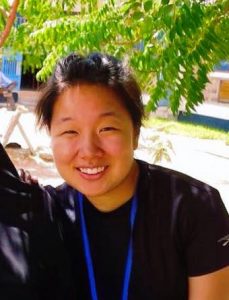 Kim is a secondary school teacher completing her Masters of Education at York University. She received her Bachelor of Arts in English/History and Bachelor of Education from York. She is currently working towards two graduate diplomas in Language Learning and Refugee and Migration Studies alongside with her Masters degree. Her research interests include language and literacy education, refugee education, border studies, and barriers that prevent access to learning in urban contexts such as inner-city Toronto as well as settings considered to be education in emergencies. HaEun worked as a Teaching Assistant for the course, “Global Issues and Education”, in the April term in Dadaab.
Kim is a secondary school teacher completing her Masters of Education at York University. She received her Bachelor of Arts in English/History and Bachelor of Education from York. She is currently working towards two graduate diplomas in Language Learning and Refugee and Migration Studies alongside with her Masters degree. Her research interests include language and literacy education, refugee education, border studies, and barriers that prevent access to learning in urban contexts such as inner-city Toronto as well as settings considered to be education in emergencies. HaEun worked as a Teaching Assistant for the course, “Global Issues and Education”, in the April term in Dadaab.